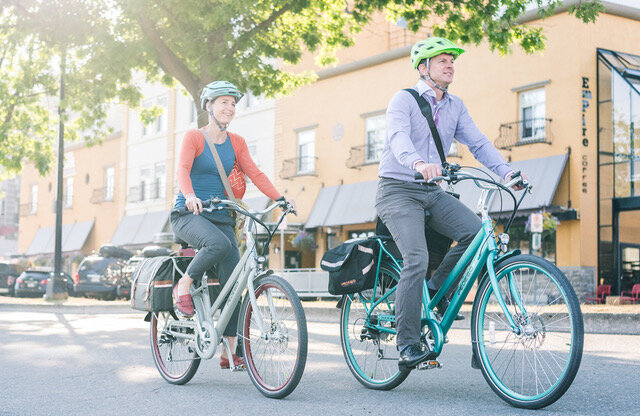New E-Bike Incentives Announced by BC Government
On July 27th, the provincial government announced new and improved incentives intended to encourage British Columbians to buy electric-assist bicycles, or e-bikes.
Investment from the ministries of Energy, Mines and Petroleum Resources, and Transportation and Infrastructure will enable cash rebates against the total cost of new e-bike purchases for the benefit of both consumers and businesses:
Credit: Pedego Electric Bikes Canada
BC consumers will be eligible for a rebate of $1,050 toward the purchase of a new e-bike, an increase of $200; the rebate is only available with the trade-in of a motor vehicle.
BC businesses will be eligible for a rebate of up to $1,700 (up to one-third of the purchase price) toward the purchase of a cargo e-bike, as part of a one-year pilot project; the rebate does not require a vehicle trade-in, and businesses may purchase up to five cargo e-bikes from a pre-selected list of eligible vehicles.
“It’s great to see CleanBC expanding, and the addition of the new incentive program for electric cargo bikes should be successful at encouraging business to use electric bikes in the place of cars,” said Mike Clyde, owner of Pedego Canada, an e-bike distributor and retailer based in Nelson, BC. “We hope these sorts of programs continue to be introduced.”
“Previously, we had not seen much uptake for electric bikes with the existing ScrapIt program; that incentive has not worked,” said Clyde, citing the motor vehicle trade-in component of the program. “A number of countries have rebates for individuals using electric bikes to commute to work —it’s our hope that our province will make electric bikes more accessible.”
While the provincial government is contributing a total of $4 million to the rebates over the next two years, some believe the conditions of the consumer program may be too restrictive to result in meaningful shifts of British Columbians out of their cars and onto bicycles.
“We’ve received many enquiries from British Columbians over the past six months about e-bike incentives — most want to buy an e-bike, but are concerned about the high retail cost and sales taxes,” said Colin Stein, Executive Director of the BC Cycling Coalition. “Since the announcement of the new rebates, we’re getting emails asking if it’s really true that they must still own a car in order to benefit from the rebate. It doesn’t seem very clean or green, and people seem upset that this is the extent of the e-bike incentive program for consumers.”
“We don’t understand why the provincial government doesn’t simply offer the incentive to any British Columbian who buys an e-bike, regardless of motor vehicle ownership.”
Businesses wishing to take advantage of the e-cargo bike rebate are also subject to specific conditions; the list of ‘Specialty-Use Vehicle Incentive Program Eligible Vehicles’ for the rebate is comprised of just two models produced by Rad Power Bikes.
“Unfortunately, it’s the wrong kind of cargo bike,” remarked Sam Starr, a Vancouver-based cycle logistics consultant. “Businesses can expect to pay $10,000-$20,000 for a cargo e-bike suitable for commercial freight, in which case the rebate should be at least doubled to have some impact; the number of e-bike purchases eligible for the rebate could then be brought down from five to three.”
“Furthermore, the challenge with cargo bikes is that they're very expensive to ship,” added Starr. “The government should invest in fostering entrepreneurship within Canada, to build up our own manufacturing capacity in this field. Why not try to bring a lot of this industry home while we incentivize consumers?”
Cargo e-bike manufacturers were required to meet certain requirements in order to make the eligibility list. “The provincial government could have worked harder to ensure that more options — particularly from manufacturers and distributors based in Canada and the US — would be available to BC businesses,” said Stein. “Retailers in BC regularly carry e-cargo bikes from Coaster Cycles, Cycles Maximus, Pedego, Tern, Urban Arrow, and more — we would like to see the province’s rebate eligibility list grow significantly, so more businesses will be able to take advantage of the program.”
“And drop the PST,” said Stein, noting that the provincial government continues to collect the 5% tax on e-bikes, whereas regular bicycles make the list of products exempt from the provincial sales tax.
More on BC’s e-Bike Rebate Program
The consumer e-bike rebate can be accessed through the Scrap-It transportation options program.
The cargo e-bike rebate can be accessed through the Plug In BC SUVI (Specialty Use Vehicle Incentives) program.
For more information about both rebates, read the announcement from the Province of British Columbia.

